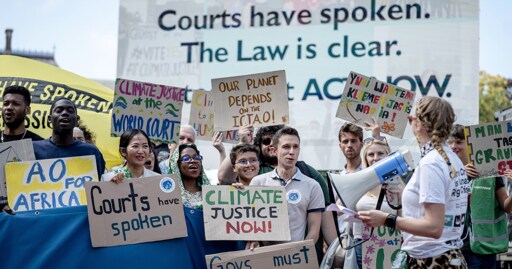This story was originally published by Inside Climate News and is reproduced here as part of the Climate Desk collaboration.
Tuesday’s landmark advisory opinion from the International Court of Justice on climate change came as residents of some island nations are already “scraping barnacles off our grandfathers’ graves” as sea-level rise accelerates, said Julian Aguon, an Indigenous human rights lawyer and writer from Guam, in a poem he recited outside the Peace Palace as the judges started their two-hour presentation.
That sense of urgency for action also came through in the 15-judge panel’s unanimous opinion. The court stated that a range of international laws charge governments with legal duties to “prevent significant harm to the environment” and “use all means at their disposal” to prevent activities within their territories from causing significant harm to Earth’s climate.
Even when governments withdraw from or haven’t ratified international climate agreements, they still have legal obligations to address climate change, the court ruled.
Among the obligations cited in the opinion are requirements for historically high polluters to cut emissions and enhance their sequestration of greenhouse gases. Governments could be violating their international legal obligations if they continue subsidizing fossil fuels and issuing new licenses for oil and gas production, the court said during an oral reading of its key findings.
If governments breach those obligations, they could be legally liable, and potentially subject to orders from the ICJ or other courts requiring them to cease climate-harming activities or make compensation payments to climate-impacted people or countries, the opinion noted.
The court also recognized climate change as a threat to human rights.
“States have obligations under international human rights law to respect and ensure the effective enjoyment of human rights by taking necessary measures to protect the climate system and other parts of the environment,” the court noted.The court also affirmed the right to a clean, healthy and sustainable environment, as recognized by more than 150 countries. That right, the court said during its oral presentation, “is essential to the enjoyment of other human rights.”
While nonbinding, the court’s opinion interprets existing laws that are binding, and the opinion can be cited in future legal actions.
The opinion was “unexpectedly clear and strong,” said Philippe Sands, an international law expert at University College London. It marks the environment coming of age in the international legal order and its unanimity gives it extra heft, he added.
The court rejected the argument from some high-emitting nations that the United Nations Framework Convention on Climate Change is the primary source of international climate governance, which they argued requires little of nations.
The opinion also made clear that even when governments withdraw from or haven’t ratified international climate agreements, they can face similar obligations under other international laws.
The process leading to the advisory opinion was sparked by young students in Pacific Island countries who have watched their homes and futures being swallowed by rising seas. Spearheaded by Vanuatu, the United Nations General Assembly in 2023 formally requested the ICJ advisory opinion.
The result is a “milestone for climate action and the discourse on climate change,” said Ralph Regenvanu, Vanuatu’s minister of lands, geology and mines, energy and water resources.
A nation’s failure to control emissions from private companies, the judges agreed, can be a breach of its international legal obligations.
“For the first time in history, the ICJ has spoken directly about the biggest threat facing humanity, which is climate change,” he said. “I want to also reflect on the importance of the science. We’ve heard in this advisory opinion that climate science is the heart of climate law and the compass for climate justice.”
The opinion recognized the Intergovernmental Panel on Climate Change as the best available source of climate science and quoted the IPCC’s prior findings that 1.5 degrees Celsius of warming is unsafe for most nations and people.
Environmental attorney Margaretha Wewerinke-Singh was co-lead counsel with Aguon for Vanuatu in the ICJ proceedings. She said the opinion will assist countries pursuing reparations for the harms they are enduring from global warming. “The court has provided critical guidance that is very helpful to those seeking climate justice,” she said.
The court made clear that when governments breach their legal obligations to address climate change, they can cause losses and damages in other countries. And the ICJ’s opinion clarified that “when there is injury or loss and damage…when a state commits a wrongful act, it is under a legal obligation to make full reparations for the damages caused.”
That’s important, Wewerinke-Singh said, “because there was an argument that liability and compensation had been excluded or made impossible” by the Paris Agreement.
Some countries with high emissions had argued that the diffuse nature of the drivers of climate change, with myriad human activities around the world adding greenhouse gases to the atmosphere, made it impossible to assign individual liability to one country or emitter, but the court dismissed that reasoning.
“The court noted that the science has evolved so much that it is actually possible to establish these causal links,” Wewerinke-Singh said. “The court made it clear that these are not necessarily obstacles.”
The judges were not required to address “each and every obligation of the parties under climate change,” said ICJ President Yuji Iwasawa, but focused on the main obligations under the UNFCCC, the Kyoto Protocol and the Paris Agreement.
The “ultimate objective” of the agreements is to stabilize greenhouse gas concentrations at a level that “would prevent dangerous anthropogenic interference with the climate system,” to make sure it’s done soon enough to allow ecosystems to adapt, and to ensure secure food production and sustainable development, Iwasawa said.
The opinion also said governments have obligations to regulate private companies and people, and failure to control emissions from private companies can be a breach of their legal obligations to address climate change.
Climate groups cheered the ruling, which has come amidst a series of rollbacks on environmental protections in a number of countries. Among them is the world’s most historically polluting nation, the United States, which is leaving the Paris Agreement and the UN climate negotiations.
“We’re a decade on now from the Paris Agreement,” said Vanuatu’s Regenvanu. “It’s very important now that we make sure our actions align with…what came out today from the courtroom. Today’s ruling, I’m sure, will also inspire new cases where victims around the world, in a legal sense, realize that they can claim their rights and seek accountability.”
From Mother Jones via this RSS feed


